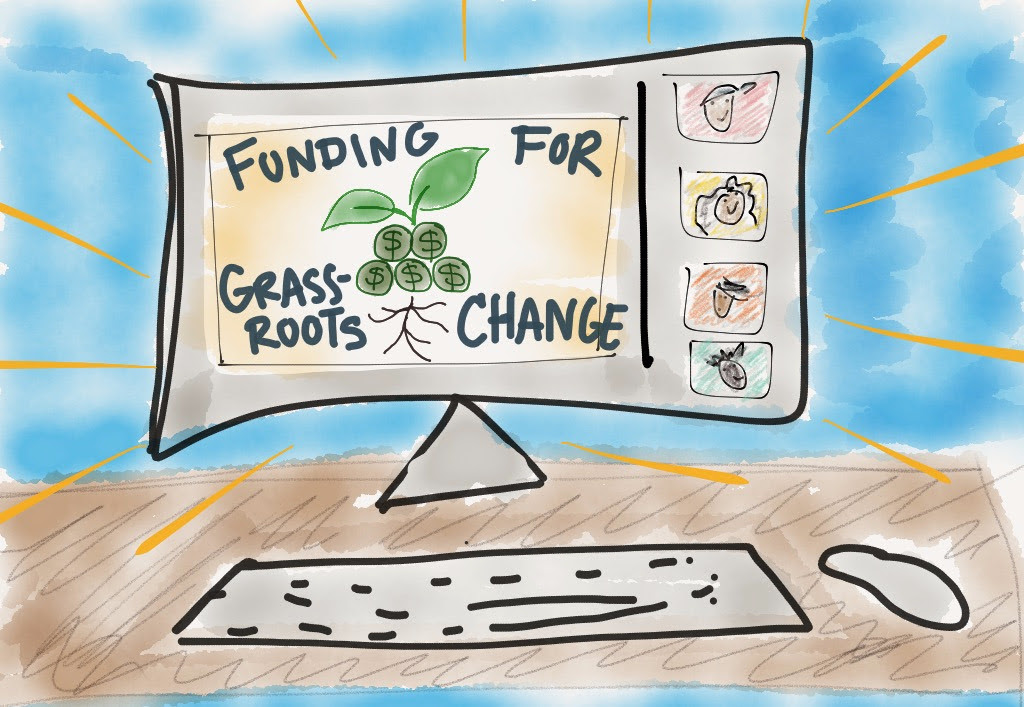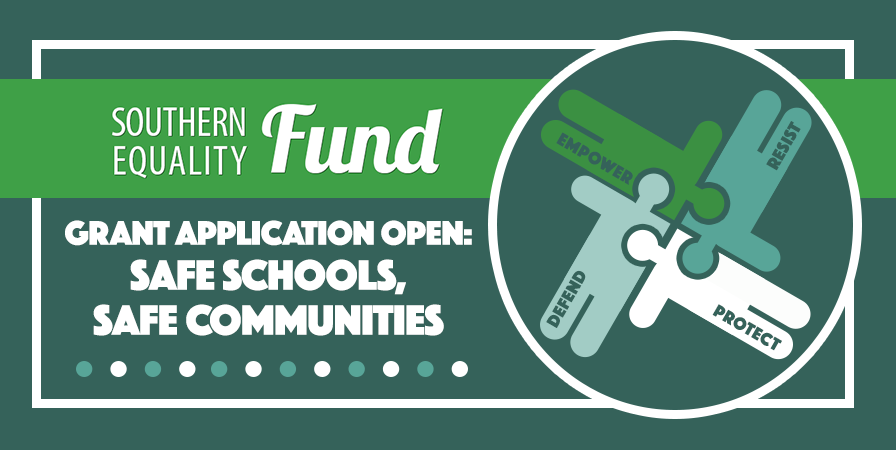
The LGBT South is a weekly email newsletter, compiling national, regional, and local news important to LGBT Southerners. Subscribe to get the latest edition to your inbox every Friday morning and keep up with what the Campaign for Southern Equality is up to!
[mc4wp_form id=”11283″]
QUOTE OF THE WEEK
“We’re often taught that there are only male or female bodies, but there’s actually a whole wide variety of possibilities when it comes to human biology. People think that biological sex is very binary, that it just has to do with your genitalia, but a lot has to go into your sex.”
– Emily Quinn, intersex advocate
Here’s your breakdown of what’s happening this week in the #LGBTsouth:
ONE STEP FORWARD, TWO STEPS BACK
This week marked the two-year anniversary of the ruling that brought marriage equality nationwide, the current political climate standing in stark contrast to the celebratory tone of that day. A series of rulings and legal actions regarding the LGBTQ community this week illustrate how fragile the state of LGBTQ rights still is.
Following on the heels of the ruling regarding Mississippi’s HB 1523, judges in North Carolina have ruled that plaintiffs in the case against SB 2 – which allows magistrates to recuse themselves from performing same-sex marriages – lack standing in the lawsuit. SB 2 has been in effect since 2015, and though last week’s ruling could allow the law to go into effect, HB 1523 is still on hold in Mississippi. These so-called “religious freedom” laws serve only one purpose – finding a new way to discriminate against same-sex couples by privileging one set of religious beliefs over others, and we will continue to fight these unjust laws until the every LGBTQ person in the South is treated equally under the law. The plaintiffs from both cases have already announced plans to appeal the rulings and show that the threat of harm from these laws is enough; we should not have to be subjected to discrimination before we can begin to fight it.
The Supreme Court also took two important actions this week. First, they ruled in favor of two Arkansas couples, ordering states to list same-sex parents on their children’s birth certificates just as they would for a straight couple. Second, they agreed to hear the case of a Colorado baker who refused to bake a wedding cake for a gay couple, a case that could decide whether religious beliefs constitute a legal pass to discriminate. The newest Justice, Trump appointee Neil Gorsuch, is already flexing his anti-LGBTQ muscle, dissenting to the Arkansas ruling with deeply flawed logic, reigniting and seemingly validating concerns that he will work to roll back progress on LGBTQ equality. These concerns become even more urgent considering the potentially devastating civil rights consequences of the Colorado case, which will be heard next year.
EXPANDING THE ACRONYM
Conversations about gender identity and the trans community have become more and more common in the past few years, with Time magazine declaring a “trans tipping point” back in 2014. But most of these conversations still focus on a binary understanding of gender. And because trans people have been rendered invisible for decades, some people feel as though gender non-conforming identities have sprung up overnight. However, there is a long, documented history of gender variant people throughout the world, from the hijras of South Asia to the two-spirit of Indigenous Americans. Today, two-spirit youth are working to reclaim their identities and amplify their voices to both honor their ancestry and create spaces for themselves in the present. Researcher and advocate Melissa Carroll says many groups will “slap on the 2S” to the end of the acronym without truly understanding the history and meaning behind it.

Another underrepresented and often excluded letter of the acronym is the intersex community. Young activists are shedding light on their experiences and what it means to be intersex. While 1.7% of the population is intersex (about as many people as have red hair), it is rarely talked about, in part because many intersex people and their parents are not even informed about their condition. Children may be subjected to unecessary and even harmful surgeries to “fix” them, without their consent. Model and activist Hanne Gaby Odiele revealed earlier this year that she is intersex, which she found out at age 17 after undergoing surgeries at age 10. She says, “I think most of the surgeries are based on fear of non-binary bodies.”
This is supported by new research that suggests that prejudice against transgender people has its roots in beliefs about the biological nature of sex and gender. Participants who were given a paper stating that “the brains of men and women are wired up differently” were much more likely to show negative attitudes toward trans communities afterward than those who read a paper stating that differences among the sexes are flexible.
WHAT ELSE?
17-year-old Ava Le’Ray Barrin is the 14th trans woman to be murdered in 2017, after being shot by an acquaintance in Athens, Georgia.
A Black, queer woman discusses how the Black Lives Matter movement gave her the courage to be visible in the heart of Appalachia.
CSE’s Executive Director, Jasmine Beach-Ferrara, spoke at a rally in Asheville this week against Republicans’ proposed changes to the Affordable Care Act.
If you’re looking for summer reading, check out the New York Times‘ rundown of the best LGBTQ literature of the last 20 years.
“Gayborhoods” like the Castro in San Francisco or Greenwich Village in NYC are seeing an influx of straight residents in recent years.
In the South and nationwide, efforts by residents to control their local schools are reproducing the effects of segregation.
New research illustrates why the need for reform in the juvenile justice system is an LGBTQ issue.
WHAT THE CAMPAIGN FOR SOUTHERN EQUALITY IS UP TO
Grassroots LGTBQ leadership is crucial to achieving lived and legal equality in the South, but it is also severely underfunded and undervalued.
We are humbled to partner with the Astraea Lesbian Foundation for Justice, Out in the South Initiative, Fund for Trans Generations, Third Wave Fund, and Trans Justice Funding Project to host the upcoming webinar, “Funding for Grassroots Change,” on Tuesday July 11, 6:30-8:00pm Eastern / 5:30-7:00pm Central.
Click here to reserve your spot today!

This free webinar will provide LGBTQ grassroots organizers across the South with the opportunity to directly connect with a panel of funders that prioritize Southern LGBTQ grassroots leadership, and to learn how to access more funding for their work. Panelists will share info about their respective funds and application processes, how to navigate the often-times mystifying world of funding, where resources are going in the South, and why it’s paramount to prioritize work led by trans people and people of color.

The need for this survey has become even more urgent as LGBTQ people are being erased from government policy and research: LGBTQ questions from the National Survey of Older Americans Act Participants (NSOAAP) and the upcoming 2020 United States Census are now gone. Our voices are needed now. Please use this survey to tell your story. Let’s make clear that our lives and experiences will not be erased.

We are excited to launch Safe Schools, Safe Communities, a new round of rapid response grants to promote safety in schools and communities across the South.
We’re open to all kinds of ideas. If it will make your community safer, we want to hear about it – whether you’re organizing a rally to speak out against violence against trans women of color; hosting trainings to provide sanctuary for undocumented immigrants; educating legislators about the importance of access to affordable healthcare; or building a coalition of staff, faculty and parents to reduce bullying against LGBTQ, immigrant and Muslim students.
We need all of these efforts and more to protect and defend those who are most vulnerable in our communities across the South. Click here to apply for funding today.
We will accept and review applications for grants of up to $500 on an ongoing basis. Applicants will receive a response within one month of submission.

